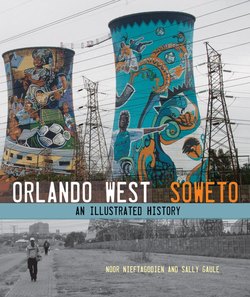Читать книгу Orlando West, Soweto - Noor Nieftagodien - Страница 7
На сайте Литреса книга снята с продажи.
ОглавлениеACKNOWLEDGEMENTS
The proposal to undertake a history project in Orlando West was raised at a community meeting of the Vilakazi Street Precinct Upgrade Project. It was an interesting idea, considering the area has received considerable attention due to its centrality in the 1976 student uprising and being home to two Nobel Peace Laureates, Nelson Mandela and Desmond Tutu. Research conducted on the iconic event and on these leaders has illuminated some aspects, especially the politics, on Orlando’s history. Nonetheless, residents expressed the view that the rich and diverse histories of the local community had not received adequate attention. The Johannesburg Development Agency (JDA) was therefore mandated by the community to include an oral history of the area in its project plans. In 2009 the History Workshop (University of the Witwatersrand) commenced with this work and after consultation agreed on a number of modest objectives, which included recording life histories of between thirty and forty residents and undertaking archival research, producing a documentary based on the interviews and photographing various aspects of everyday life in the area. In addition local researchers were to be trained and a manuscript written. The achievement of these objectives is due to the support and contributions from numerous people.
The JDA not only provided funds but offered all sorts of logistical support and advice. Kirsten Harrison and Tanya Zack embraced the community’s proposal with enthusiasm and were the early drivers behind the project. Their insistence on proper historical research was crucial in defining its character. Thanduxolo Ntoyi played a critical role as the liaison between our work as researchers, the JDA and the community. Thando Mendrew, the current CEO of the JDA, and Susan Monyai were exceedingly helpful and were critical in steering the project to its conclusion in the form of this book.
Ali Hlongwane played an important role in facilitating relations with the existing heritage organisations. The Hector Pieterson Museum, Mandela Museum and the June 16th Foundation supported and encouraged our work. The former also hosted our workshop with teachers. Several other local entities and people, including the Ward Committee, local councillors and political activists engaged us throughout the life of the project. Sifiso Ndlovu, the key historian on the Soweto Uprising, was always generous in his response to our queries.
Dumisane Khesa, Sakhile Mthabela and Tshepo Ramutumbu were the main local researchers on the project. Two others, Joy Matthews and Boitumelo Khoza left when they found long-term employment elsewhere. The remaining three attended training workshops, conducted interviews and spent many weeks in the archives. Despite some challenges their collective effort added value to the research. It was agreed at the outset to photograph contemporary life in the area and to collect photos from residents. Sally Gaule brought her skills and experience to bear on both these aspects and mentored Sakhile in the process. The two of them mounted a successful exhibition based on the photographs taken during the course of the project. In addition, Sally has produced an insightful and sensitive photo-essay as the last chapter of the book.
Wonderboy Peters and his crew of young film-makers spent a number of weekends video-recording interviews with several residents, and produced a documentary on the history of Orlando, which has been enthusiastically received in the community. Copies have been distributed to interviewees and schools in the area.
The research team based at the History Workshop was, as usual, outstanding. Tshepo Moloi played a pivotal role in conducting interviews and acting as a mentor to the local researchers. His expertise as an interviewer is evident in the documentary and this book. Transcribing interviews is a critical but often neglected part of oral history. Plantinah Dire, Tshegofatso Leeuw, Sibongile Mgwebi, Reabetswe Kgaruwe, Mojabeng Liholo, Bongani Khumalo and Musawenkosi Malabela ensured the interviews were reliably transcribed and translated. Our administrators, Zahn Gowar, Gugulethu Nyathikazi and Ms Sifiso Ndlovu often went beyond the call of duty to address a steady stream of demands. Phil Bonner was always supportive and participated in the training workshop.
The librarians and archivists at the university’s William Cullen Library were very helpful and exceedingly patient in assisting our local researchers. Without the support of Wits Press this book would not have seen the light of day. Monica Seeber was a patient and professional editor, and Melanie Pequeux steered the project to its conclusion.
Many residents of Orlando West welcomed us into their homes to be interviewed and photographed. Their stories are at the heart of this book. We hope our various efforts have met their expectations of contributing to an understanding of the rich history of the area.
Noor Nieftagodien
History Workshop
University of the Witwatersrand
